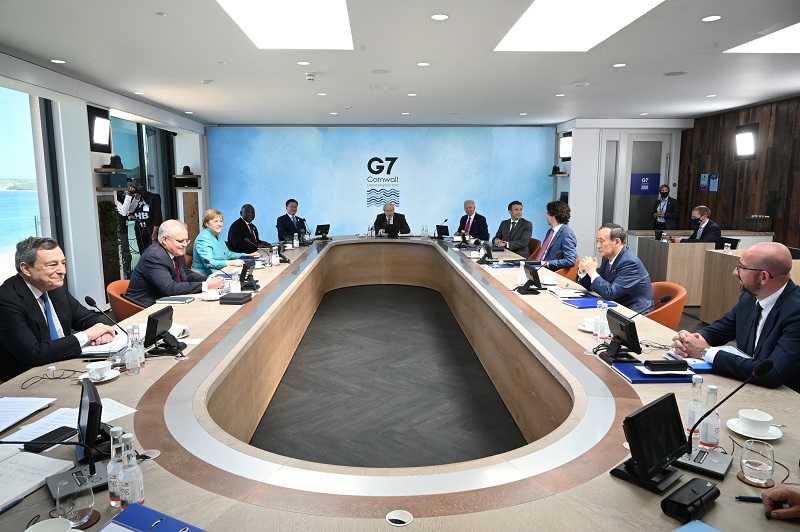
British Prime Minister Boris Johnson, U.S. President Joe Biden, France’s President Emmanuel Macron, Canadian Prime Minister Justin Trudeau, Japanese Prime Minister Yoshihide Suga, President of the European Council Charles Michel, Italian Prime Minister Mario Draghi, Australia’s Prime Minister Scott Morrison, German Chancellor Angela Merkel, South Africa’s President Cyril Ramaphosa and South Korea’s President Moon Jae-in attend a working session during G7 summit in Carbis Bay, Cornwall, Britain, June 12, 2021.
11:48 JST, June 14, 2021
CORNWALL, England / BEIJING — Leaders of the Group of Seven major industrialized nations agreed at their recent summit to act in concert in economic areas, apparently in a bid to counter an increasingly hegemonic China.
Behind this move is a growing sense of crisis that the G7 nations must act in concert if they are to handle China. If the confrontation intensifies, however, divisions and conflicts in the world may deepen further.
Fears over supply dependency
“Supply chain vulnerability is a problem,” Prime Minister Yoshihide Suga said to other leaders on the first day of the three-day gathering, during a session held on the global economic recovery.
The spread of infections with the novel coronavirus has exposed developed democracies’ reliance on China for a supply of pharmaceutical materials and ingredients, as well as medical goods such as face masks. The flow of people and goods also ground to a halt, causing delays in the procurement of parts and components that hindered the manufacture of such products as automobiles.
According to a Japanese government source, Suga’s remarks won support from other leaders. There were particular comments about the importance of supply in the field of public health. The discussion became energetic and continued well past the scheduled ending time.
The G7 nations have been expediting efforts to rebuild supply chains, partly because greater investments are expected in order to digitize more of the economy in the post-pandemic era, and in areas related to decarbonization. If such investment proceeds but countries remain dependent on China, the G7 nations may be taken advantage of by Beijing, for example through an exodus of key technologies.
U.S. to lead infrastructure support
In addition to Japan, the United States has also openly demonstrated its sense of concern regarding China.
The previous U.S. administration of then-President Donald Trump attached little importance to multilateral cooperation and pressured China through bilateral negotiations. But current U.S. President Joe Biden shifted the strategy to form an international coalition of countries to contain China via multilateral efforts.
At the G7 summit, the leaders agreed to create a new financial assistance system, led by the United States, to support infrastructure development in developing countries. The U.S. government estimates there will be capital demand totaling $40 trillion (about ¥4,400 trillion) in developing countries by 2035.
The first summit for the G20, which comprises 19 major economies and the European Union, was held in 2008 in the wake of the “Lehman shock.” At that time, China’s economy was a little larger than 10% of the G7 nations combined. Thanks to its rapid growth in the years that followed, China’s economy has since expanded to about 40% of the G7 in 2020. It is becoming difficult even for the United States to compete with China alone.
Risk of division
Chinese authorities are not hiding their displeasure over the G7’s formation of an international coalition to restrain China. Yang Jiechi, a top Chinese diplomat and politburo member of the Chinese Communist Party, said during phone talks on Friday with U.S. Secretary of State Antony Blinken that “genuine multilateralism is not pseudo-multilateralism based on the interests of small circles.”
A spokesperson for the Chinese Embassy in Britain said Saturday that “world affairs should be handled through consultation by all countries. The days when global decisions were dictated by a small group of countries are long gone.”
While its confrontational relationship with the United States continued, China reinforced its ties with the European Union and other countries. Beijing also succeeded in having Britain, Germany, France, Italy and Canada join the Asian Infrastructure Investment Bank (AIIB), the China-led development bank established in 2015.
But the G7 nations have recently united in turning a critical eye toward China.
Takahide Kiuchi of Nomura Research Institute, Ltd., said: “If the tendency to contain China grows within the G7, it will give China cause to counter such moves. This could heighten the risk of deepening divisions and conflict in the world.”
Top Articles in Politics
-

Japan PM Takaichi’s Cabinet Resigns en Masse
-

Sanae Takaichi Elected Prime Minister of Japan; Keeps All Cabinet Appointees from Previous Term
-

Japan’s Govt to Submit Road Map for Growth Strategy in March, PM Takaichi to Announce in Upcoming Policy Speech
-

LDP Wins Historic Landslide Victory
-

LDP Wins Landslide Victory, Secures Single-party Majority; Ruling Coalition with JIP Poised to Secure Over 300 seats (UPDATE 1)
JN ACCESS RANKING
-

Japan PM Takaichi’s Cabinet Resigns en Masse
-

Japan Institute to Use Domestic Commercial Optical Lattice Clock to Set Japan Standard Time
-

Israeli Ambassador to Japan Speaks about Japan’s Role in the Reconstruction of Gaza
-

Man Infected with Measles Reportedly Dined at Restaurant in Tokyo Station
-

Videos Plagiarized, Reposted with False Subtitles Claiming ‘Ryukyu Belongs to China’; Anti-China False Information Also Posted in Japan






















